Global South

In 1980, for the first time in 1,000 years, more believers following the babe in Bethlehem lived in the global South than the North, and in four decades since then this has accelerated. Growth in Latin America means 600 million exchange “Feliz Navidad,” or “Feliz Natal” (Portuguese) during these days in crowded Catholic cathedrals, megachurches, and Pentecostal storefronts. This is an increase of 10 million in the past year.

Some of my friends have been talking about giving up the “evangelical” label, because of what it has come to be associated with, in this year’s political campaign. I’m not ready to make that move. I spent a good part of the 1960s trying hard not to be an evangelical, but without success.
When I marched for civil rights during my graduate school years, I helped to organize “ban the bomb” marches and protested the Vietnam War. I was clearly out of step with much of the evangelicalism of the day.

So who was the real loser in Iowa last night? The "evangelical" brand. For weeks now the nation has heard the media talk about "evangelicals" — by which they actually mean white, highly conservative, older, mostly male voters motivated by their faith. Last night one pundit after another analyzed who this “evangelical” vote supported, with data showing Ted Cruz winning significant backing.

A Vatican envoy urged the World Trade Organization to keep promises made to the poor, amid concerns that its tariff-cutting efforts are disproportionately benefiting rich countries. The appeal came as the WTO, a Geneva-based organization that regulates international trade, was holding a four-day meeting ending Dec. 18 in the Kenyan capital.
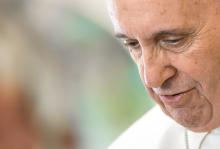
Pope Francis wrapped up his six-day trip to Africa in the war-torn Central Africa Republic on Nov. 30 by warning that religious conflicts are spawning civil war, terrorism, and suffering throughout the continent.
“Together we must say no to hatred, to revenge and to violence, especially violence perpetrated in the name of a religion or of God himself,” the pope said in Bangui, the capital.
“Together, we must say no to hatred, to revenge and to violence, particularly that violence which is perpetrated in the name of a religion or of God himself. God is peace, ‘salaam,’ ” the pope said, using the Arabic word for peace.

The morning prayer that starts each session of a major gathering of Catholic churchmen underway here is an important chance for the 270 cardinals and bishops from around the world to set a meditative tone for what are contentious debates about church teachings on sexuality and family life.
With Pope Francis leading the way, the prelates seated in a large Vatican lecture hall chant the traditional Latin prayers pausing near the end for a brief reflection on the day’s Scripture by one of the bishops at the meeting, known as a synod.
Yet even that moment of spiritual peace is not always a sanctuary from the tensions roiling the three-week meeting that ends Oct. 25.

Ghanaian Archbishop Charles Palmer-Buckle on Oct. 8 defended African bishops’ role in the Vatican’s meeting on family issues, stating they were not in Rome to block progress but to present their own views.
As bishops get to work discussing key issues affecting family life at the meeting, known as a synod, they have broken into small language-based groups. Palmer-Buckle was responding to a question at a press conference suggesting that African bishops were trying to stop “progress.”
“If someone thinks Africa is blocking something, it’s only proposing what we feel,” he told journalists at the Vatican.
“We’re not here to block anybody.”

When President Obama meets with Pope Francis tomorrow, the world will catch a glimpse of what history looks like. The first pope from the global South in 1200 years will be welcomed in the White House by the first African-American president of the United States. This picture will be worth far, far more than a thousand words.
Pundits will analyze each public word spoken, and search for hints about the private words exchanged between these two. The politics of Pope Francis’ interaction with the President, and later with Congress, will fuel incessant speculation from Washington’s insiders. But around the world, and particularly in the global South, it’s the symbol of this meeting which will matter.
Pope Francis represents the changing face of world Christianity. Today, one billion Christians are found in Latin America and Africa. In 1980, more Christians were found in the global South than in the North for the first time in a thousand years. Every day, that movement accelerates. Francis’ words about the world’s injustices, and his actions of humble human solidarity, project the voice and longings of world Christianity’s new majority and resonant far beyond the boundaries of this faith.
President Obama symbolizes the changing demographics of America. Hope and demographics elected him in 2008, and by 2012 the changing face of the electorate in the U.S. proved determinative of America’s political future. Today, a majority of babies born in the U.S. are non-white, and some major urban areas already reflect the coming reality of a society without a racial majority.

A new report mapping the Catholic Church’s more than 1.2 billion souls — on track to reach 1.64 billion by 2050 — holds some surprises.
And not all bode well for the church’s future as it faces major demographic and social shifts.
“Global Catholicism: Trends & Forecasts,” released June 1 by the Center for Applied Research in the Apostolate at Georgetown University, looks at seven regions of the world. It wraps the United States, Mexico, and Canada in with Central and South America as simply the Americas.

“It’s a new form of Christianity,” explained Opoku Onyinah, “now also living in the West.” He’s the president of the Ghana Pentecostal and Charismatic Council, and also heads the Church of Pentecost, begun in Ghana and now in 84 nations. Onyinah was speaking at a workshop on “How Shall We Walk Between Cultures,” and explaining how African Christianity is interacting with postmodern culture. It was part of Empowered21, which gathered thousands of Pentecostals in Jerusalem over Pentecost.
I’ve found this idea intriguing. Pentecostalism, especially as it is emerging in the non-Western world, is a postmodern faith. Often I’ve said, “An evangelical wants to know what you believe, while a Pentecostal wants to hear your spiritual story.” Perhaps it’s an oversimplification. But Pentecostalism embodies a strong emphasis on narrative and finds reality in spiritual experiences that defy the logic and rationality of modern Western culture.
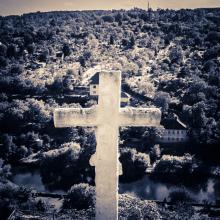
It’s important to listen to the stories told through the numbers as well as the untold stories. As a non-American, it is surprising to hear my brothers and sisters throw out phrases like, “the church is in decline,” when what you are referring to is the church in America. The global church is alive and well and thriving in many areas of the world, and what joy it would be to allow their voices to speak into the congregations of the global North. Many of the polarizing, divisive issues in the American church, such as gay marriage, abortion, and the death penalty, are being discussed by the global church outside the context of the binary lenses of the American left and right. These outside voices can serve to soften the rhetoric hurled by each side, and also give perspective to the priority placed on them in light of the problems faced by the global South.

The center of Christianity has dramatically shifted, and that means the agenda was very different from the northern and western agendas of the older white evangelicals in America and the issues they think most important. Korea could play a particular and convening role as a bridge between the churches of the global north and south.
In sharp and grateful contrast to the old ideologies of global North evangelicals, these global South evangelicals spent their time together wrestling with issues of global economic inequality, the realities of climate change, the imperatives of racial justice, and the need for Christians to wage peace instead of war. Since these are the issues that global evangelical and Pentecostal constituencies are facing in their own lives — and of course, the Bible addresses all of them as the central issues Christians need to confront today — the narrow, white American evangelical agenda had no interest in this global evangelical and Pentecostal forum. The fact is that they represent a different evangelical world.
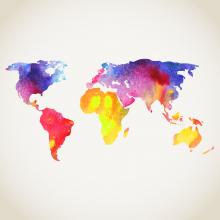
If religious conservatives are truly awakening to the need to dialogue with global Christians, they need to be consistent. It doesn’t make sense to exploit non-Western perspectives on LGBT rights but refuse to hear those same voices on matters such as nationbuilding, war, immigration, environmental policy, and foreign aid.
The inconsistency leads me to believe that these calls are more about political posturing than a desire to really listen to our global brothers and sisters.
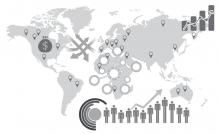
The story of world Christianity’s recent pilgrimage is dramatic and historically unprecedented. The “center of gravity” of Christianity’s presence in the world rested comfortably in Europe for centuries. In 1500, 95 percent of all Christians were in that region, and four centuries later, in 1910, 80 percent of all Christians were in Europe or North America.
But then, world Christianity began the most dramatic geographical shift in its history, moving rapidly toward the global South, and then also toward the East. By 1980, for the first time in 1,000 years, more Christians were found in the global South than the North. Growth in Africa was and remains incredible, with one of our four Christians now an African, and moving toward 40 percent of world Christianity by 2025. Asia’s Christian population, now at 350 million, will grow to 460 million by that same time. Even today, it’s estimated that more Christians worship on any given Sunday in churches in China than in the U.S.

The 6.5 million people in the greater Houston area now surpass New York City and Los Angeles as the most racially and ethnically diverse urban area in the U.S. That's the site where a broad spectrum of U.S. church leaders met this week to consider the impact of immigration on their congregations, and on the rapidly changing expressions of Christianity within North American culture.
The group gathered at the annual convocation of Christian Churches Together in the USA, which includes the leadership of the U.S. Catholic Conference of Bishops, several Pentecostal and evangelical denominations, the Orthodox Churches, some Historic Black churches, and nearly all the major historic Protestant denominations. All of these are experiencing the impact of immigration. Most dramatically, for instance, 54 percent of millennials — those born after 1982 — who are Catholic are Latinos. Of the 44 million people living in the United States who were born in another country, 74 percent are Christian, while only 5 percent are Muslim, 4 percent Buddhist, and 3 percent Hindu.
While church leaders in the U.S. have expressed united support for the reform of U.S. immigration laws, this is the first time an ecumenical body has gathered to examine together the actual consequences of immigration on the life and witness of its churches.
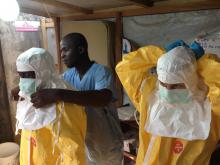
In the past few months, the world has witnessed the worst outbreak of Ebola since the disease was first identified in 1976 — it has already claimed the lives of more than 3,400 people. But while the first cases in the U.S. and Spain have stirred fears over the past week, we don’t need to fear an unstoppable epidemic in developed countries. As World Bank President Jim Yong Kim aptly put it in a piece for the Huffington Post:
The knowledge and infrastructure to treat the sick and contain the virus exists in high- and middle-income counties. However, over many years, we have failed to make these things accessible to low-income people in Guinea, Liberia, and Sierra Leone. So now thousands of people in these countries are dying because, in the lottery of birth, they were born in the wrong place.
Dr. Kim makes the crucial point here — the current Ebola outbreak is much more than a public health crisis — it is an inequality crisis.
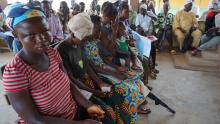
The headlines and talk shows are dominated by the response ISIS. To be clear, this group readily uses fanatical and brutal actions to achieve its radically exclusive vision. The images they skillfully project are like violent, X-rated video games made real. No wonder that many react to this horror with chills going down their spines. But there is something that worries me more: the ongoing Ebola crisis.
How did ISIS come about? Sure, there’s huge complexity. Yet, we know that ISIS never would have emerged without, first of all, the U.S. invasion of Iraq and the ensuing, devastating war that left that nation in physical, political, and psychological shambles. Second, the sectarian, Shia-dominated regime, which emerged as the final U.S. ground troops left, further radicalized Sunni extremists. These factors were the breeding grounds for black-clothed fanatics ready to cut down any who differ with their identity, even if the majority of its victims are Muslims.
ISIS’s greatest recruiting tool is continued and renewed U.S. and Western military intervention in the Middle East. That, of course, is what their brutal actions are attempting to provoke. The moral callousness of this strategy inspires the fear which they desire and welcome.
However, ISIS can and will be contained. The neighboring regimes in the region are all deeply threatened by ISIS. In the end, they will be compelled to combat and resist ISIS the more these fanatics move out of the desert and toward others’ homelands. It will be bloody, but eventually other nation states and threatened sectarian groups, representing for the most part more mainstream and globally dominant expressions of Islam, will contain and defeat ISIS. The necessity and means of outside military assistance from the West and elsewhere is highly debatable, and at the end of the day, I don’t believe this will be the decisive factor.
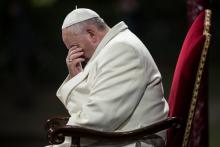
The latest dust-up about the unscripted words of Pope Francis came this week when he tweeted, in Latin, “Inequality is the root of social evil.” Conservative Catholics had their underwear in a bundle, nervously tweeting away about the dangers of addressing complex issues on Twitter, and warning about thinking that “redistribution” would solve global inequities. Some feared this was giving Thomas Piketty’s new popular book, Capital in the Twenty-First Century, more press. Liberal Catholics were delightfully surprised, once again, and argued that the pope was doing nothing more than putting Catholic social teaching into a tweet.
Inequality is the root of social evil.
— Pope Francis (@Pontifex) April 28, 2014But this latest interchange, happening of course between Catholics in the global “North,” misses the real point.
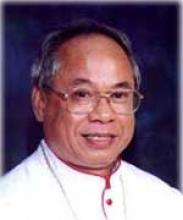
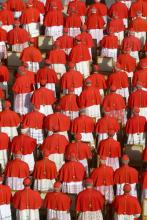
IN MINDANAO, Philippines, a cheer went up: Mayron tayong cardinal! (“We have a cardinal!”) In January, Orlando B. Quevedo, archbishop of Cotabato, was one of 19 new cardinals named by Pope Francis.
Cardinal Quevedo rose from newsboy to archbishop. He’s renowned for his interreligious work and cofounding a Catholic-Muslim peace community in the southern Philippines where there is violent ethnic conflict. Quevedo is a leader in the Federation of Asian Bishops’ Conferences, a body representing more than 100 million Catholics that has courageously pushed forward the values of Vatican II amid traditionalist backlash.
During a papal conclave, when a new pope is chosen, much of the world, Catholic and otherwise, pays close attention to the news ticker from the Vatican. For the selection of new cardinals, not so much. But with Francis, everything bears watching.
Historically, cardinals were called “the princes of the church” because of the power they wielded. Functionally, they serve in the College of Cardinals, which meets with the pope to deal with questions of major importance and elects new popes. Sadly, scoring a red hat has been for some the acme of clerical ambition. The season of cardinal picking can devolve into extravagant indulgence.
But, there’s a new sheriff in town: Pope Francis wants deputies, not darlings.